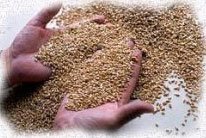Organic And Inorganic Fertilizers
Saturday, September 09, 2006 To use organic or inorganic? These days, that is the question that is being posed in gardens across the country. The subject of organic vs. inorganic fertilizers has sparked controversy, with both camps standing firm on their turf. Of course, both organic fertilizers and inorganic fertilizers have advantages and disadvantages of their own.
To use organic or inorganic? These days, that is the question that is being posed in gardens across the country. The subject of organic vs. inorganic fertilizers has sparked controversy, with both camps standing firm on their turf. Of course, both organic fertilizers and inorganic fertilizers have advantages and disadvantages of their own.For the most part, plants will not recognize the difference between nutrients coming from organic sources, and those coming from inorganic fertilizers. Read on to better understand the merits and demerits of both.
Organic Fertilizers
Fertilizers labeled "organic" are derived from materials that are essentially carbon in nature. These materials that constitute organic fertilizers are derived from either animal or plant by-products.
Using organic fertilizers has advantages and downfalls. One distinct benefit of organic fertilizers is that they naturally contain matter that is beneficial to both plants and soil. The natural materials found in organic fertilizers help improve the water-holding capacity of the soil, and augments its structure to increase its nutrient-holding capacity. Additionally, the organic materials encourage microbial activity. This plays a big part in the breakdown of nutrients, which allows the plants to absorb the nutrients.
Organic fertilizers tend to break down and release nutrients more slowly, so that leaching is prevented. By using organic fertilizers, you can rest assured that groundwater will not be contaminated by any harmful substances. Organic fertilizers are generally less expensive than inorganic alternatives, and may be available free of charge if you know how and where to look.
There are disadvantages to using organic fertilizers. These materials may be difficult to apply in comparison to inorganic fertilizers, depending on the source material used. Organic fertilizers tend to have lower nutrient content compared to inorganic fertilizers, so more material has to be applied in order to get the same nutrient amount. In addition, the slow-release properties can actually have a detrimental effect on the plants. If the nutrients from organic fertilizers are not released in time, the plants will not receive them for use in their growth cycle.
Inorganic Fertilizers
Inorganic fertilizers are widely available in today's market. There are so many different varieties; it can be hard to choose the best one. To make a wise, informed choice, you must first understand the components of typical inorganic fertilizers.
Every bag of inorganic fertilizer is generally labeled with a set of three numbers. These numbers represent the ratio of Nitrogen - Phosphorus - Potassium. For example, if you choose an inorganic fertilizer that's labeled "7-3-2", it means that there is seven percent Nitrogen, three percent Phosphorus, and two percent Potassium.
When you add these numbers, the sum is just twelve percent worth of nutrients in the bag. The remaining 88 percent of made up of filler material and may contain additional nutrients. These extra materials are added help the user to apply the fertilizer more evenly.
When it's time to choose a fertilizer for your lawn or garden - organic or inorganic - know what's in the bag, and more importantly, what's best for your property.
